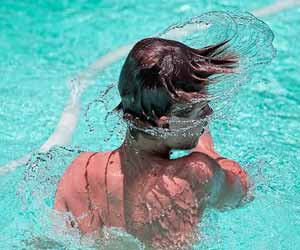- Home
- Editorial
- News
- Practice Guidelines
- Anesthesiology Guidelines
- Cancer Guidelines
- Cardiac Sciences Guidelines
- Critical Care Guidelines
- Dentistry Guidelines
- Dermatology Guidelines
- Diabetes and Endo Guidelines
- Diagnostics Guidelines
- ENT Guidelines
- Featured Practice Guidelines
- Gastroenterology Guidelines
- Geriatrics Guidelines
- Medicine Guidelines
- Nephrology Guidelines
- Neurosciences Guidelines
- Obs and Gynae Guidelines
- Ophthalmology Guidelines
- Orthopaedics Guidelines
- Paediatrics Guidelines
- Psychiatry Guidelines
- Pulmonology Guidelines
- Radiology Guidelines
- Surgery Guidelines
- Urology Guidelines
Violent head shaking to remove water from ears could damage child's brain

SEATTLE -Researchers at Cornell University and Virginia Tech have found that shaking the head to free trapped water can cause brain damage in small children. Trapped water in the ear canal is a source of infection but removing water by head shaking can cause complications. Anuj Baskota, Seungho Kim, Hosung Kang, and Sunghwan Jung have presented their findings at the American Physical Society’s Division of Fluid Dynamics 72nd Annual Meeting.
Children and adults commonly experience having water trapped in the ear canals after swimming. To remove the water, individuals will shake their head sideways. It requires more acceleration of the head of children to remove the trapped water since a child's ear canal has a smaller diameter. This critical acceleration may cause serious damage to the child's brain.
“Our research mainly focuses on the acceleration required to get the water out of the ear lobe,” said Baskota. “The critical acceleration that we obtained experimentally on glass tubes and 3D printed ear canals was around the range of 10 times the force of gravity for infant ear sizes, which could cause damage to the brain.”
For adults, the acceleration was lower due to the larger diameter of the ear canals. They said the overall volume and position of the water in the canal changes the acceleration needed to remove it.
“From our experiments and theoretical model, we figured out that surface tension of the fluid is one of the crucial factors promoting the water to get stuck in ear canals,” said Baskota.
Luckily, the researchers said there is a solution that does not involve any head shaking.
“Presumably, putting a few drops of a liquid with lower surface tension than water, like alcohol or vinegar, in the ear would reduce the surface tension force allowing the water to flow out,” Baskota said.
The session, “Acceleration-induced water ejection in the human ear canal,” was presented at 4:18 p.m. Pacific (U.S.) on Saturday, Nov. 23 in Room 613 as part of a session on biological fluid dynamics.

Disclaimer: This site is primarily intended for healthcare professionals. Any content/information on this website does not replace the advice of medical and/or health professionals and should not be construed as medical/diagnostic advice/endorsement or prescription. Use of this site is subject to our terms of use, privacy policy, advertisement policy. © 2020 Minerva Medical Treatment Pvt Ltd